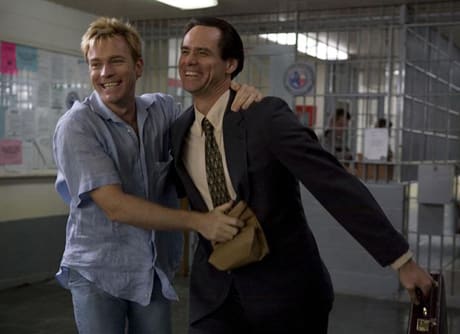After leaving his fundamentalist wife (Leslie Mann) and ho-hum policing gig to embrace a pricey consumerist lifestyle, out of the closet, recidivist conman Steven Russell (Jim Carrey) winds up in prison, where he meets the love of his life: Phillip Morris (Ewan McGregor).
Embarking upon terrain decidedly adjacent to the moony, asexual, homosexual depictions on Modern Family and Ugly Betty, Carrey exclaims, "Enough romance, let's fuck!," jumping from eye contact to butt-fucking, with full sound effects and doggie-style vividness, in a split second, flipping the bird to traditionalist romantic conventions.
Coming from Bad Santa scribes Glenn Ficarra and John Requa, this flippant, crass attitude towards the bourgeois lifestyle isn't a surprise, even if the candid queer ethos may shock anyone looking for another dose of I Now Pronounce You Chuck & Larry.
It's the first half of the film, where the nascent lovers dive into a suburban lifestyle with quick-witted, satirical aplomb, buying a picturesque home and filling it with all the latest gadgetry while humping relentlessly and offending the neighbours, which propels I Love You Phillip Morris. But in the periphery, Carrey's illegalities ― stealing cash and conning his way into high-powered jobs ― foreshadows the impending downfall, an admonitory of aberrant living.
These eventual parallels ― linking promiscuity to criminality and prison to AIDS ― ultimately categorize this comedy as a heteronormative affirmation of Judeo-Christian ethics, regardless of preliminary mockery and buggery. There's a patronizing sense of moral righteousness that contradicts itself, stemming in part from the fact that this is a true story, but mostly from the narrative paradigm, affirming collective values and the dominant notion that a healthy homosexual is an assimilative one begging to be let into an existing boys' club.
Despite this inevitable grotesquery and insult, there are enough laugh-out-loud moments to sustain and shock the senses from an entertainment standpoint. When McGregor's delight at upbeat adages in chocolate wrappers turns sour after reading, "A smile is like a flower on your face," it's easy to forget that you're being quietly manipulated.
(Alliance)Embarking upon terrain decidedly adjacent to the moony, asexual, homosexual depictions on Modern Family and Ugly Betty, Carrey exclaims, "Enough romance, let's fuck!," jumping from eye contact to butt-fucking, with full sound effects and doggie-style vividness, in a split second, flipping the bird to traditionalist romantic conventions.
Coming from Bad Santa scribes Glenn Ficarra and John Requa, this flippant, crass attitude towards the bourgeois lifestyle isn't a surprise, even if the candid queer ethos may shock anyone looking for another dose of I Now Pronounce You Chuck & Larry.
It's the first half of the film, where the nascent lovers dive into a suburban lifestyle with quick-witted, satirical aplomb, buying a picturesque home and filling it with all the latest gadgetry while humping relentlessly and offending the neighbours, which propels I Love You Phillip Morris. But in the periphery, Carrey's illegalities ― stealing cash and conning his way into high-powered jobs ― foreshadows the impending downfall, an admonitory of aberrant living.
These eventual parallels ― linking promiscuity to criminality and prison to AIDS ― ultimately categorize this comedy as a heteronormative affirmation of Judeo-Christian ethics, regardless of preliminary mockery and buggery. There's a patronizing sense of moral righteousness that contradicts itself, stemming in part from the fact that this is a true story, but mostly from the narrative paradigm, affirming collective values and the dominant notion that a healthy homosexual is an assimilative one begging to be let into an existing boys' club.
Despite this inevitable grotesquery and insult, there are enough laugh-out-loud moments to sustain and shock the senses from an entertainment standpoint. When McGregor's delight at upbeat adages in chocolate wrappers turns sour after reading, "A smile is like a flower on your face," it's easy to forget that you're being quietly manipulated.
